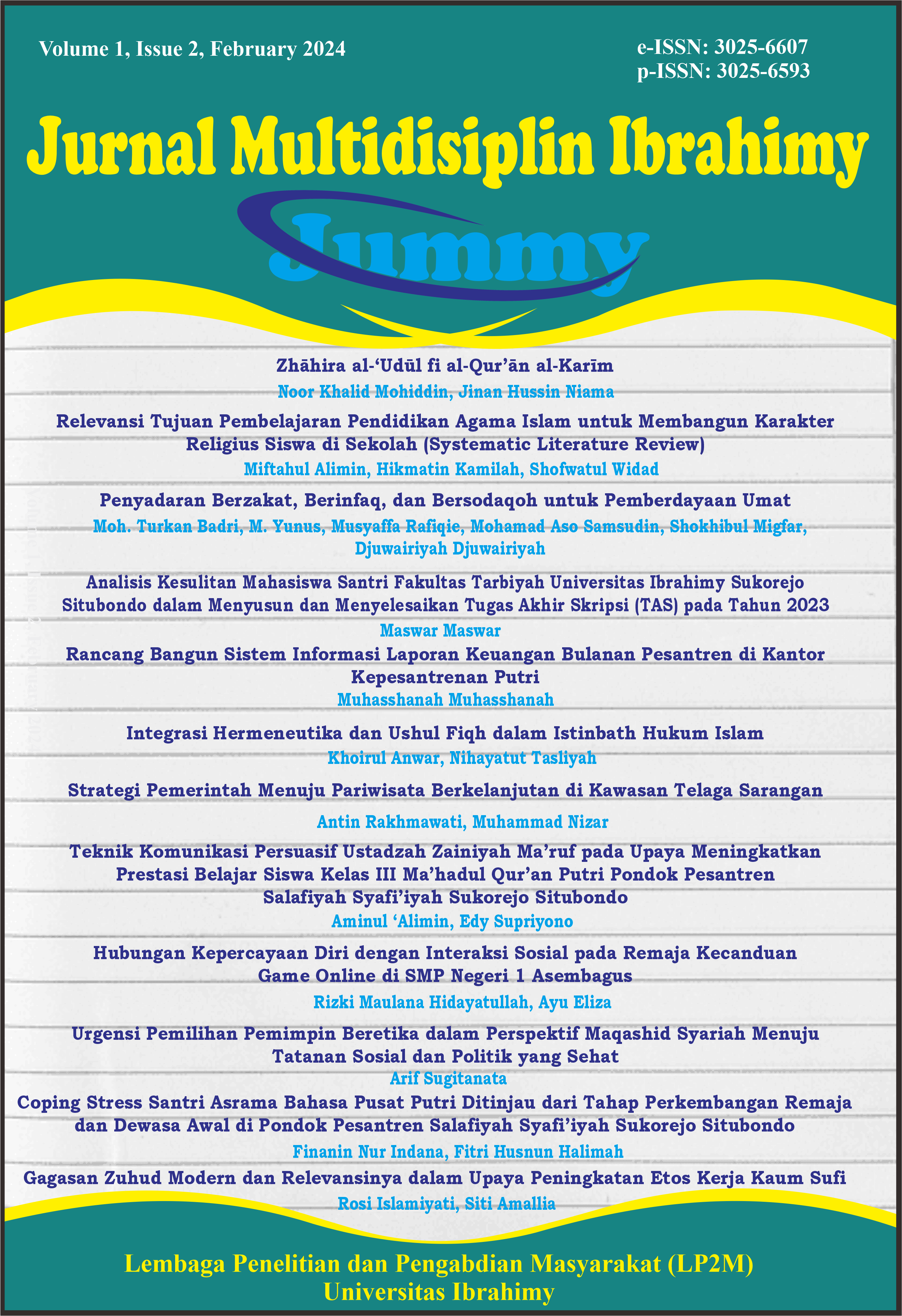Penyadaran Berzakat, Berinfaq, dan Bersodaqoh untuk Pemberdayaan Umat
Abstrak
Zakat, infaq, and shodaqah were once sources of state income to empower the people. This fact occurred in the early golden era of Islam, so zakat or obligatory zakat institutions at that time had difficulty distributing zakat because zakat was already evenly distributed and met the needs of its recipients. This fact is different from the facts today, where zakat, infaq, and shodaqah have not been able to empower the people. There is an idea to revitalize the function of zakat through raising awareness in the community. This study is a literature study by collecting literature supporting this idea's achievement. The results of this study show that empowerment of the people can be pursued again by providing awareness to the people to pay zakat and managers to carry it out according to applicable regulations, whether according to fiqh or legislation.
Referensi
Ahmad, Hamang, & M. Nasri. (2018). Pengaruh Pendidikan Islam Terhadap Peningkatan Kesadaran Bayar Zakat Mal Bagi Petani. Istiqra, 5(2), 1–9.
Al-Salih, A. N. (2020). The role of Zakat in establishing social welfare and economic sustainability: The case of Saudi Arabia. International Journal of Financial Research, 11(6), 196.
Ali, I., & Hatta, Z. A. (2014). Zakat as a Poverty Reduction Mechanism Among the M uslim Community: Case Study of B angladesh, M alaysia, and I ndonesia. Asian Social Work and Policy Review, 8(1), 59–70.
Chotib, M., Faiz, M. F., & Abdullah, I. (2023). Establishing a Zakat Culture based on Good Zakat Governance and Good Zakat Empowerment in Indonesia. Journal of Islamic Economics Perspectives, 5(2), 1–11.
Fadli, A. (2018). Pengaruh Latar Belakang Pendidikan Guru Agama Islam Terhadap Pembelajaran Zakat Dan Implementasinya Di Madrasah Tsanawiyah Al- Khairiyah Kp. Bahari,Jakarta Utara. Tesis, 1–241.
Hariyanto, E., Taufiq, M., Abidin, Z., Ulum, M., & Maimun, M. (2020). Effectiveness of the Economic System to Zakat and Waqf for Empowerment of the Ummah in Indonesia. International Journal of Advanced Science and Technology, 29(06), 1910–1916.
Indra, S. (2018). Economic empowerment model for the poor through zakat institution under maqashid syariah concept in West Kalimantan. Asian Journal of Social Science Studies, 3(1), 54.
Kasanah, N. (2021). Implementasi Pengelolaan Zakat Infak dan Sedekah di UPZIS NU Care Lazisnu Desa Mrican Kecamatan Jenangan Kabupaten Ponorogo. Journal of Islamic Philanthropy and Disaster (JOIPAD), 1(1), 71–89.
Kholidah, N., & Hakim, M. R. (2021). Analysis of zakat empowerment in the era of pandemy COVID-19 towards impossible material and spiritual aspects Mustahik. Jurnal Ilmiah Ekonomi Islam, 7(3), 1653–1662.
Kurniawan, T. (2022). Strategi Kebijakan Pembangunan Sosial Melalui Gerakan Filantropi Islam Di Kabupaten Belitung. Fikri: Jurnal Kajian Agama, Sosial Dan Budaya, 7(2), 116–133.
Mahtum, R. (2023). Aspek-Aspek Pendidikan Fiqih di Pesantren untuk Membangun Kesetaraan dan Perdamaian Dunia. Jurnal Multidisiplin Ibrahimy, 1(1), 73–94.
Mas’ud, H. A., Alfidai, A., Tuhari, S., Abdurrouf, & Hasan. (2016). Pedoman Organisasi NU-Care Lazisnu. 255.
Meerangani, K. A. (2019). The effectiveness of zakat in developing muslims in Malaysia. Insaniyat: Journal of Islam and Humanities, 3(2), 127–138.
Mukrimaa, S. S., Nurdyansyah, Fahyuni, E. F., YULIA CITRA, A., Schulz, N. D., غسان, د., Taniredja, T., Faridli, E. M., & Harmianto, S. (2016). Problem Zakat di Indonesia. Jurnal Penelitian Pendidikan Guru Sekolah Dasar, 6(August), 128.
Rahman, T. (2015). Akuntansi Zakat, Infak Dan Sedekah (PSAK 109): Upaya Peningkatan Transparansi dan Akuntabilitas Organisasi Pengelola Zakat (OPZ). Muqtasid: Jurnal Ekonomi Dan Perbankan Syariah, 6(1), 141. https://doi.org/10.18326/muqtasid.v6i1.141-164
Raimi, L., Patel, A., & Adelopo, I. (2014). Corporate social responsibility, Waqf system and Zakat system as faith-based model for poverty reduction. World Journal of Entrepreneurship, Management and Sustainable Development, 10(3), 228–242.
Rofi, S., Prasetiya, B., & Setiawan, B. A. (2019). Pendidikan Karakter Dengan Pendekatan Tasawuf Modern Hamka dan Transformatif Kontemporer. Intiqad: Jurnal Agama Dan Pendidikan Islam, 11(2), 396–414.
Solihatunimah, Muna, N. EL, & Ahdi, M. W. (2022). Implementasi pengelolaan dana infaq dan sedekah dalam meningkatkan kesejahterakan masyarakat. ISTISMAR : Jurnal Kajian, Penelitian Ekonomi Dan Bisnis Islam, 3(2), 1–13.
Syafiq, A. (2018). Peningkatan Kesadaran Masyarakat Dalam Menunaikan Zakat, Infaq, Sedekah Dan Wakaf (Ziswaf). Zakat Dan Wakaf, 5(2), 362–385.
Syukur, T. A. (2010). Pengantar Studi Islam. Penerbit Karya Bakti Makmur (KBM) Indonesia.
Zauro, N. A., Zauro, N. A., Saad, R. A. J., & Sawandi, N. (2020). Enhancing socio-economic justice and financial inclusion in Nigeria: The role of zakat, Sadaqah and Qardhul Hassan. Journal of Islamic Accounting and Business Research, 11(3), 555–572.
##submission.copyrightStatement##
##submission.license.cc.by-sa4.footer##










_by_Matematohir.jpg)


